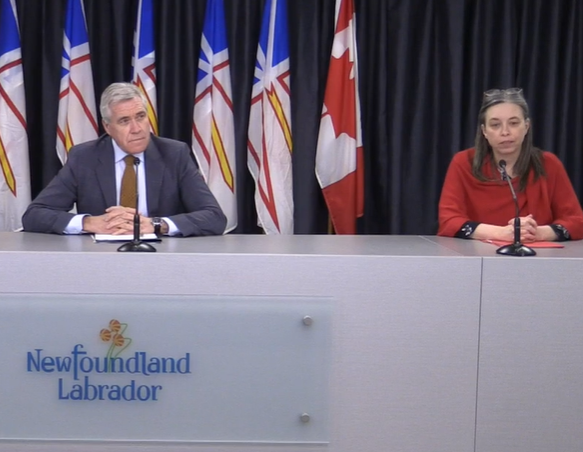Officials in Newfoundland and Labrador reported the province’s first COVID-19-related death along with 13 new confirmed cases of the virus Monday.

In a press conference, NL Health and Community Services Minister John Haggie indicated that a 78-year-old man passed away Sunday evening as a result of contracting the novel coronavirus.
It’s the first COVID-19 related death reported in Atlantic Canada.
READ MORE: Newfoundland and Labrador reports Atlantic region’s first COVID-19 death
Premier Dwight Ball also took part in the update, beginning his address by sending condolences to the family and asking for their privacy to be respected.
The 13 new cases brings Newfoundland and Labrador’s total number of cases to 148.
Along with 15 new cases identified Sunday the province has seen a slight decrease in its daily numbers, however the province’s chief medical officer of health Dr. Janice Fitzgerald warns against thinking that numbers will continue to drop.
Fitzgerald said as they move toward more general testing rather than samples related to the transmission of COVID-19 at a NL funeral home it’s likely the numbers will continue to be less than their highest reported days.
Minister Haggie echoed the medical officer’s sentiments urging the public that now is not the time to let up on efforts to flatten the curve.
“Please don’t use that as a cause or excuse for complacency,” he said. “This is not the time to look for loopholes, this is the time to stay the course.”
“Just because we’ve seen a dip in numbers doesn’t mean to say that’s the start of a new trend,” Haggie explained. “It would be most unwise to assume that under any circumstances.”
“We are not out of the woods yet,” he said.
Haggie also said currently they are testing between 200-300 samples per day and that at this time he’s not aware of any bottle-necking slowing the process.
“If there is a need to change our testing policy on the basis of developments, and this is a fluid situation, then we would be happy to reconsider and do differently,” he explained.
As of noon Sunday 2,107 people in had been tested with 1,972 confirmed negative.
- Ultra-processed food tied to higher risk of early death, study finds. What to avoid
- N.S. couple felt they won ‘doctor lottery’ after years on wait-list. Now they’re back on it
- Panera to remove ‘Charged Sips’ drink from Canada amid wrongful death lawsuits
- More than half of parents report burnout, U.S. study finds. What can be done?
“Questions about COVID-19? Here are some things you need to know:
Health officials caution against all international travel. Returning travellers are legally obligated to self-isolate for 14 days, beginning March 26, in case they develop symptoms and to prevent spreading the virus to others. Some provinces and territories have also implemented additional recommendations or enforcement measures to ensure those returning to the area self-isolate.
Symptoms can include fever, cough and difficulty breathing — very similar to a cold or flu. Some people can develop a more severe illness. People most at risk of this include older adults and people with severe chronic medical conditions like heart, lung or kidney disease. If you develop symptoms, contact public health authorities.
To prevent the virus from spreading, experts recommend frequent handwashing and coughing into your sleeve. They also recommend minimizing contact with others, staying home as much as possible and maintaining a distance of two metres from other people if you go out.
For full COVID-19 coverage from Global News, click here.”





Comments